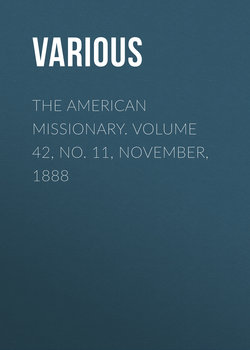Читать книгу The American Missionary. Volume 42, No. 11, November, 1888 - Various - Страница 4
NOT QUITE FREE
THE MOHONK CONFERENCE
ОглавлениеThis Conference is unique in its character, and in the place where it is held. Lake Mohonk was born in a great earthquake that sunk it in its solid rocky bed, and piled up around it wonderful ranges of hills and vast splintered rocks. The splendid summer resort built on the margin of the Lake is the work of Mr. A.K. Smiley, a man of creative genius, and of kind manners and a warm heart. The house, or rather the range of houses, is picturesque, and the walks among the hills and down the rocky gorges, and the forty miles of excellent roads, give the widest scope for walking and driving.
The Conference is the invention of Mr. Smiley. To it, he invites annually a hundred or more guests, giving them the freedom of the house; and three days are spent in the discussion of Indian affairs, interspersed with afternoon drives amid the striking scenery. The invitation is extended to those who are supposed to be intelligently interested in the Indians; but within that limit there is the freest range—men and women of all political parties and of all religious denominations being included. The acts of the Conference, like the utterances of a Congregational Council, have only the authority of the reason that is in them; yet it is wonderful what an influence this peculiar body has had on public sentiment. Its utterances have been discussed and have had their weight in the pulpit, the press, in Congress and in the White House. The Indian and the Nation owe much to the Mohonk Conference.
The Sixth Annual Conference, which closed September 28th, sustained the interest of past years in the importance of the topics discussed, in the divergency of opinion at first, and in the complete harmony at the end. The points agreed upon in the platform were arranged under five heads. The first relates to the establishment of Courts of Justice in the Reservations and accessible to the Indians; the second to the important need of education, demanding that the Government shall undertake at once the entire task of providing primary and secular education for all Indian children; the third urges that this education shall be compulsory, under proper limitations; the fourth emphasizes the duty of the churches to furnish religious instruction to the Indians, and the immunity of their work from all governmental interference where sustained wholly by missionary funds; the fifth approves of the co-operation of the Government with the missionary societies in contract schools during the present transitional condition of the Indians. We append the last two items of the report.
4. In view of the great work which the Christian Churches have done in the past in inaugurating and maintaining schools among the Indians, and of the essential importance of religious as distinguished from secular education, for their civil, political and moral well-being, an element of education which, in the nature of the case, the National Government cannot afford, the churches should be allowed the largest liberty, not, indeed, to take away the responsibility from the Government in its legitimate sphere of educational work, but to supplement it to the fullest extent in their power, by such schools, whether primary, normal or theological, as are at the sole cost of the benevolent or missionary societies. And it is the deliberate judgment of this Conference that in the crisis of the Indian transitional movement the churches should arouse themselves to the magnitude and emergency of the duty thus laid upon them in the providence of God.
5. Nothing should be done to impair or weaken the agencies at present engaged in the work of Indian education. Every such agency should be encouraged and promoted, except as other and better agencies are provided for the work. In particular, owing to the anomalous condition of the Indians and the fact that the Government is administering trust funds that belong to them, what is known as the "contract system"—by which the nation aids by appropriations private and missionary societies in the work of Indian education—ought to be maintained by a continuance of such aid, until the Government is prepared, with adequate buildings and competent teachers, to assume the entire work of secular education. In no case should the Government establish schools to compete with private or church schools which are already doing a good work, so long as there are thousands of Indian children for whose education no provision is made.
